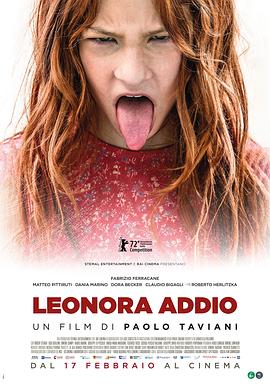莱奥诺拉的告别

简介
Three years after the loss of his brother Vittorio, with whom he shared his entire career, Paolo Taviani returns to the works of Luigi Pirandello, which the pair adapted in 1984 (Chaos) and 1998 (You Laugh). In keeping with the Sicilian playwright’s vision, the film is not at all what it appears to be. The title may come from a 1910 novella, but there is no trace of that book’s jealousy-riddled plot. Instead, the focus is on Pirandello himself, or rather, his ashes, which are transported from a hasty burial site in fascist Rome to a permanent resting place in Sicily, on a trek that takes us through post-war Italy and its filmed memories, as seen in newsreels, amateur films and fragments of Neorealism. Having buried the master, Leonora addio then shifts gear from road movie to film adaptation, but here it picks a different Pirandello story, namely the last one, written shortly before his death in 1936. From the farewell of the title to its return to the writer’s last words, it is hard not to read this work, so free and yet so much a part of the Taviani world, as a moving brotherly farewell which, just as in 2012’s Golden Bear winner Caesar Must Die, once again uses cinema to give voice to literature and history.
大结局
《莱奥诺拉的告别》大结局的情节如下:
莱奥诺拉在电视上看到了她的儿子,这让她非常兴奋和激动。同时,她也意识到自己的身体已经越来越虚弱。在这个时候,她决定跟丈夫吉诺一起去看望儿子。
在路上,莱奥诺拉和吉诺回忆起了自己的生活和婚姻。他们在这段时间里,重新审视了彼此的生命,并且坦诚了对彼此的爱和关心。
最终,莱奥诺拉和吉诺来到了儿子的家里。他们看到了儿子和孙子,这让他们非常感动。莱奥诺拉在这个时候也告诉了儿子自己的身体情况,并且表示自己很快就要离开这个世界了。
最后,莱奥诺拉在儿子和孙子的怀抱中,安详地离开了这个世界。吉诺和儿子也在她的葬礼上,共同悼念这位伟大的母亲和妻子。 电影在此落幕。
热门大结局
- 2013-中国-电影-《天注定》
- 2000-中国-电影-《站台2000》
- 2020-美国-电影-《特斯拉》
- 2023-美国-电影-《渗透》
- 1983-台湾-电影-《看海的日子》
- 2007-台湾-电影-《色,戒》
- 2004-中国-电影-《世界》
- 2016-韩国-电影-《激情社区》
- 2021-台湾-电影-《角头外传:浪流连》
- 1952-美国-电影-《乞力马扎罗的雪》
- 2000-法国-电影-《幽情秘恋》
- 1988-台湾-电影-《少妇恋情》
- 2007-美国-电影-《潜水钟与蝴蝶》
- 2004-意大利-电影-《别碰我》
- 2017-台湾-电影-《大佛普拉斯》
- 2019-越南-电影-《再见,妈妈》
- 2022-韩国-电影-《下一个素熙》
- 1996-台湾-电影-《喋血劫花》
- 2020-美国-电影-《迷盲》
- 2015-日本-电影-《进击的巨人番外篇E03》
